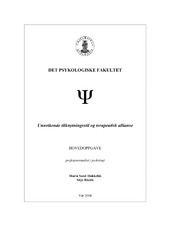Unnvikende tilknytningsstil og terapeutisk allianse
Master thesis
Permanent lenke
https://hdl.handle.net/1956/7952Utgivelsesdato
2014-04-14Metadata
Vis full innførselSamlinger
- Faculty of Psychology [527]
Sammendrag
Attachment theory adds to the understanding of therapeutic processes and their outcome. Attachment style affects the therapeutic alliance, which is an important factor in therapeutic change. The relationship between dismissing attachment style and the therapeutic alliance will be discussed in this paper. Dismissing attachment style is associated with inner working models that cause challenges in entering close relationships. The association between dismissing attachment and the alliance components goals, tasks and emotional bond will be discussed, based on the current literature and recent studies. According to this literature, clients with a dismissing attachment style in particular will have challenges regarding establishing a emotional bond, but are more able to engage in a therapeutic collaboration regarding goals and tasks as they are appraised as less emotionally threatening. A less emotional focus in the initial therapy phases can help this group achieve greater security, which strengthens the emotional bond to the therapist. Tilknytningsteori representerer et bidrag til forståelsen av terapeutiske prosesser og behandlingsutfall i psykoterapi. Tilknytningsstil har innvirkning på terapeutisk allianse som er en viktig faktor for terapeutisk endring. I denne oppgaven belyser vi sammenhengen mellom unnvikende tilknytningsstil og den terapeutiske allianse. Unnvikende tilknytningsstil har etablerte arbeidsmodeller som innebærer utfordringer med å inngå i nære relasjoner. Sammenhengen mellom unnvikende tilknytning og alliansekomponentene mål, oppgaver og emosjonelt bånd diskuteres basert på foreliggende litteratur og empiriske studier. Litteraturen indikerer at denne klientgruppen har særlige utfordringer knyttet til etablering av det emosjonelle båndet, men mestrer bedre å inngå i et terapeutisk samarbeid om komponentene mål og oppgaver da disse oppleves mindre emosjonelt truende. Et mindre emosjonelt fokus i de innledende terapifasene kan bidra til at denne gruppen oppnår økt trygghet, som styrker det emosjonelle båndet til terapeuten.
